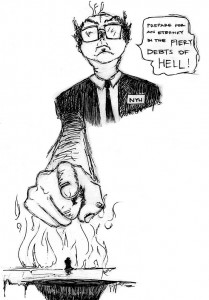NYU policy shows college hypocrisy
New York University, under pressure following a publicity nightmare, recently restructured its application policy in order to provide fee waivers to low-income students. Even though NYU has a need-blind admissions process, until very recently, the university denied most requests for application fee waivers from disadvantaged students. As a result, the policy prevented entry to NYU for applicants from low-income backgrounds, even though finances should not play a part in the evaluation of their merit.
The reversal in policy from NYU came only four days after the NYU Tisch School of the Arts refused to offer a waiver for the $65 application fee to applicant Joshua Jackson, who posted an email chain with an admissions officer, inciting public outrage. Dan Sanford, the director of graduate admissions at the Tisch School, explained to Jackson in an email that the original fee waiver policy was in place because “if $65 is a hardship for you, how will you be able to pay the tuition of $60,000?” As a result of the backlash, NYU changed its policy to emphasize the university’s commitment to diversity and reaffirmed that it will ensure that application fee waivers are granted to all students with legitimate financial need.
While Jackson’s actions were ultimately successful in changing NYU’s policy online, the original policy itself calls into question the commitment of the university to diversify its student body. If NYU claims to desire diversity, and also claims to have a need-blind admissions process, then it must ensure that applicants can apply regardless of their financial backgrounds.
Applications are the knock on the door to higher education — they are not a guarantee of admittance or a financial aid package. If a potential student has legitimate financial need, and a university has declared that it wants to pursue diversity in its student body, then it must be prepared to make decisions that take into account the fact that not everyone in a diverse student body can pay even an application fee out of pocket.
Running a premier university necessarily incurs massive administrative costs, and application fees exist to help offset the cost of evaluating applications. Though NYU has a $3.5 billion endowment, it only spends 7 percent of its operating budget for administrative purposes. Given that the Tisch School alone received almost 3,000 applications last year, and the individual $65 fees from each application add up to nearly $200,000 collectively, application evaluations represent a considerable revenue to the university. That being said, to some prospective students, a $65 application fee can be a substantial strain. That strain, however, does not reflect their ability as a student or their prospects post-graduation, which should be NYU’s primary concerns.
What Sanford seemed to forget in his exchange with Jackson, besides the goal of diversity, is that admittance to a university is a sign of faith in the student’s ability and a vehicle for social mobility. Simply being allowed the chance to be evaluated shouldn’t depend on potentially insurmountable financial barriers. After all, the purpose of college is mainly to advance career prospects, giving individuals the chance to escape low socioeconomic status through merit. If that chance is not extended to people because of their inability to pay an application fee, then the college admissions process at a school like NYU is not truly need-blind.
This sort of inclusivity and social mobility is why a truly need-blind admissions process is important to maintain, including offering application fee waivers. Luckily, USC is one of 103 universities that maintain a need-blind admissions process. NYU is also on the list, however, which calls into question the trustworthiness of need-blind admissions processes across the country. Universities exist to invest in the future of their students and society, much like how students invest their time and money into their own education. The primary considerations of universities such as USC and NYU should be the contributions of their students to the world and their ability to succeed on and off campus. Application fees, on the other hand, are not nearly as critical for the reputation and operation of large universities. In cases of legitimate need, they should be waived, especially if a university purports to seek diversity in its student body.


No sarcasm, but I genuinely don’t get it. “This sort of inclusivity and social mobility is why a truly need-blind admissions process is important to maintain, including offering application fee waivers.” If the application process is “need blind” does that not mean that the application process is the same for everybody, needy or not? Look at this way: The application process should be “religion blind,” meaning that it sees no religion of the applicant. The application is not “need blind” if it provides different treatment based on the student’s financial ability to come up with the application fee. Another point: If the fee is $65, NYU or any college has the cost of personnel, computers, etc. to process applications. Is $65 unfair? Only if one knows the cost to NYU. If they are making an inappropriately large, greedy profit from applications, maybe $65 is unfair. Finally, if no application fee because the student claims to be needy, does this not mean a lot of extra applications, costing NYU, for the needy who actually have no business applying because they are not even qualified? Please explain, if you understand. I don’t.